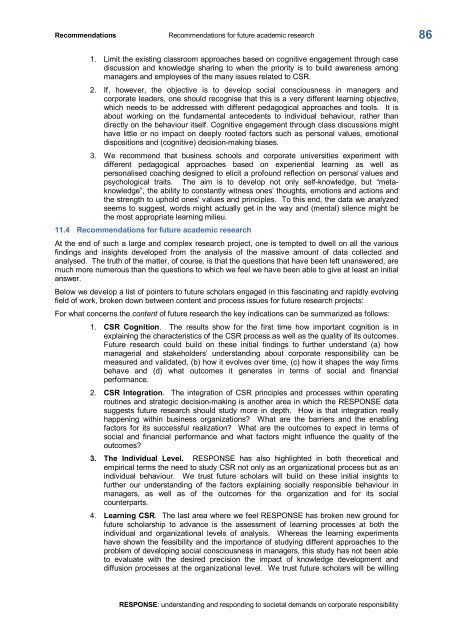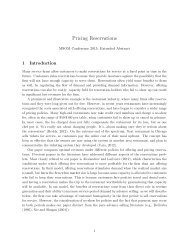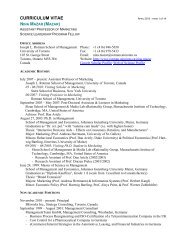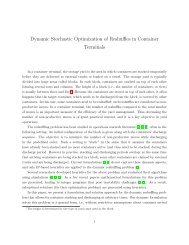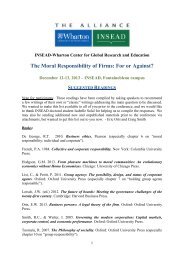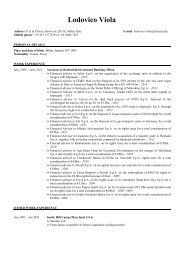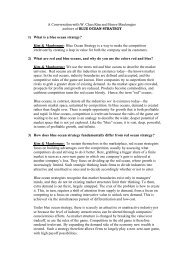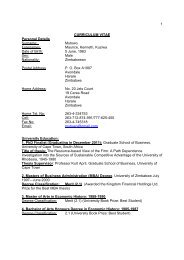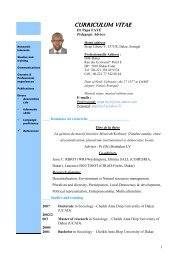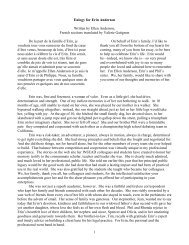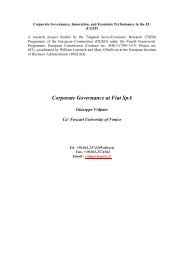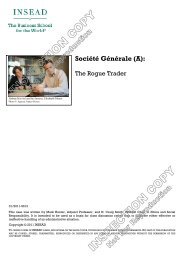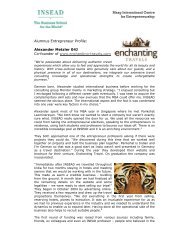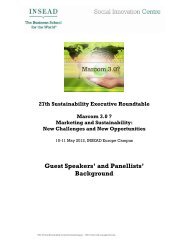RESPONSE - Insead
RESPONSE - Insead
RESPONSE - Insead
Create successful ePaper yourself
Turn your PDF publications into a flip-book with our unique Google optimized e-Paper software.
Recommendations Recommendations for future academic research<br />
1. Limit the existing classroom approaches based on cognitive engagement through case<br />
discussion and knowledge sharing to when the priority is to build awareness among<br />
managers and employees of the many issues related to CSR.<br />
2. If, however, the objective is to develop social consciousness in managers and<br />
corporate leaders, one should recognise that this is a very different learning objective,<br />
which needs to be addressed with different pedagogical approaches and tools. It is<br />
about working on the fundamental antecedents to individual behaviour, rather than<br />
directly on the behaviour itself. Cognitive engagement through class discussions might<br />
have little or no impact on deeply rooted factors such as personal values, emotional<br />
dispositions and (cognitive) decisionmaking biases.<br />
3. We recommend that business schools and corporate universities experiment with<br />
different pedagogical approaches based on experiential learning as well as<br />
personalised coaching designed to elicit a profound reflection on personal values and<br />
psychological traits. The aim is to develop not only selfknowledge, but “meta<br />
knowledge”, the ability to constantly witness ones’ thoughts, emotions and actions and<br />
the strength to uphold ones’ values and principles. To this end, the data we analyzed<br />
seems to suggest, words might actually get in the way and (mental) silence might be<br />
the most appropriate learning milieu.<br />
11.4 Recommendations for future academic research<br />
At the end of such a large and complex research project, one is tempted to dwell on all the various<br />
findings and insights developed from the analysis of the massive amount of data collected and<br />
analysed. The truth of the matter, of course, is that the questions that have been left unanswered, are<br />
much more numerous than the questions to which we feel we have been able to give at least an initial<br />
answer.<br />
Below we develop a list of pointers to future scholars engaged in this fascinating and rapidly evolving<br />
field of work, broken down between content and process issues for future research projects:<br />
For what concerns the content of future research the key indications can be summarized as follows:<br />
1. CSR Cognition. The results show for the first time how important cognition is in<br />
explaining the characteristics of the CSR process as well as the quality of its outcomes.<br />
Future research could build on these initial findings to further understand (a) how<br />
managerial and stakeholders’ understanding about corporate responsibility can be<br />
measured and validated, (b) how it evolves over time, (c) how it shapes the way firms<br />
behave and (d) what outcomes it generates in terms of social and financial<br />
performance.<br />
2. CSR Integration. The integration of CSR principles and processes within operating<br />
routines and strategic decisionmaking is another area in which the <strong>RESPONSE</strong> data<br />
suggests future research should study more in depth. How is that integration really<br />
happening within business organizations? What are the barriers and the enabling<br />
factors for its successful realization? What are the outcomes to expect in terms of<br />
social and financial performance and what factors might influence the quality of the<br />
outcomes?<br />
3. The Individual Level. <strong>RESPONSE</strong> has also highlighted in both theoretical and<br />
empirical terms the need to study CSR not only as an organizational process but as an<br />
individual behaviour. We trust future scholars will build on these initial insights to<br />
further our understanding of the factors explaining socially responsible behaviour in<br />
managers, as well as of the outcomes for the organization and for its social<br />
counterparts.<br />
4. Learning CSR. The last area where we feel <strong>RESPONSE</strong> has broken new ground for<br />
future scholarship to advance is the assessment of learning processes at both the<br />
individual and organizational levels of analysis. Whereas the learning experiments<br />
have shown the feasibility and the importance of studying different approaches to the<br />
problem of developing social consciousness in managers, this study has not been able<br />
to evaluate with the desired precision the impact of knowledge development and<br />
diffusion processes at the organizational level. We trust future scholars will be willing<br />
<strong>RESPONSE</strong>: understanding and responding to societal demands on corporate responsibility<br />
86


